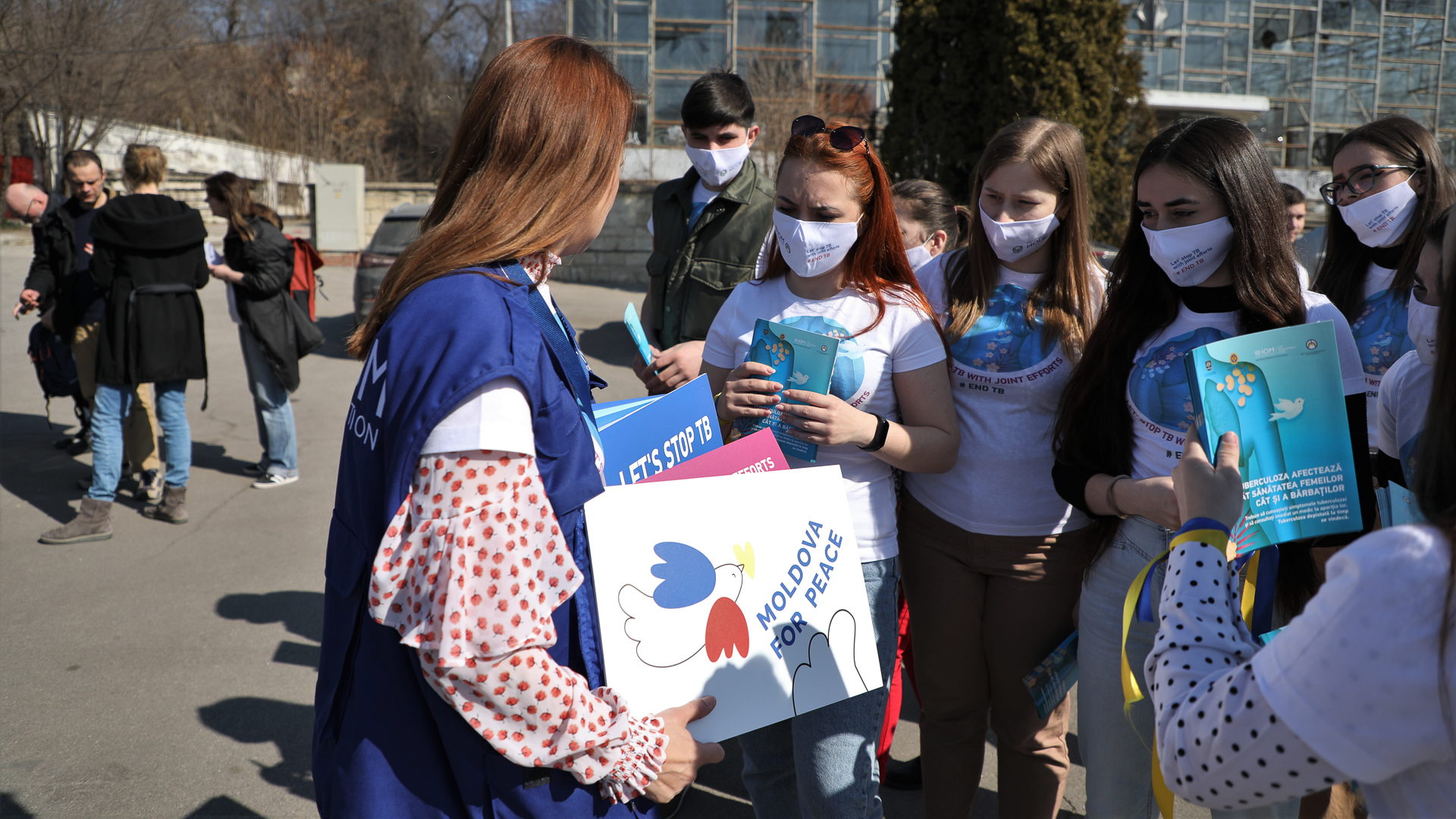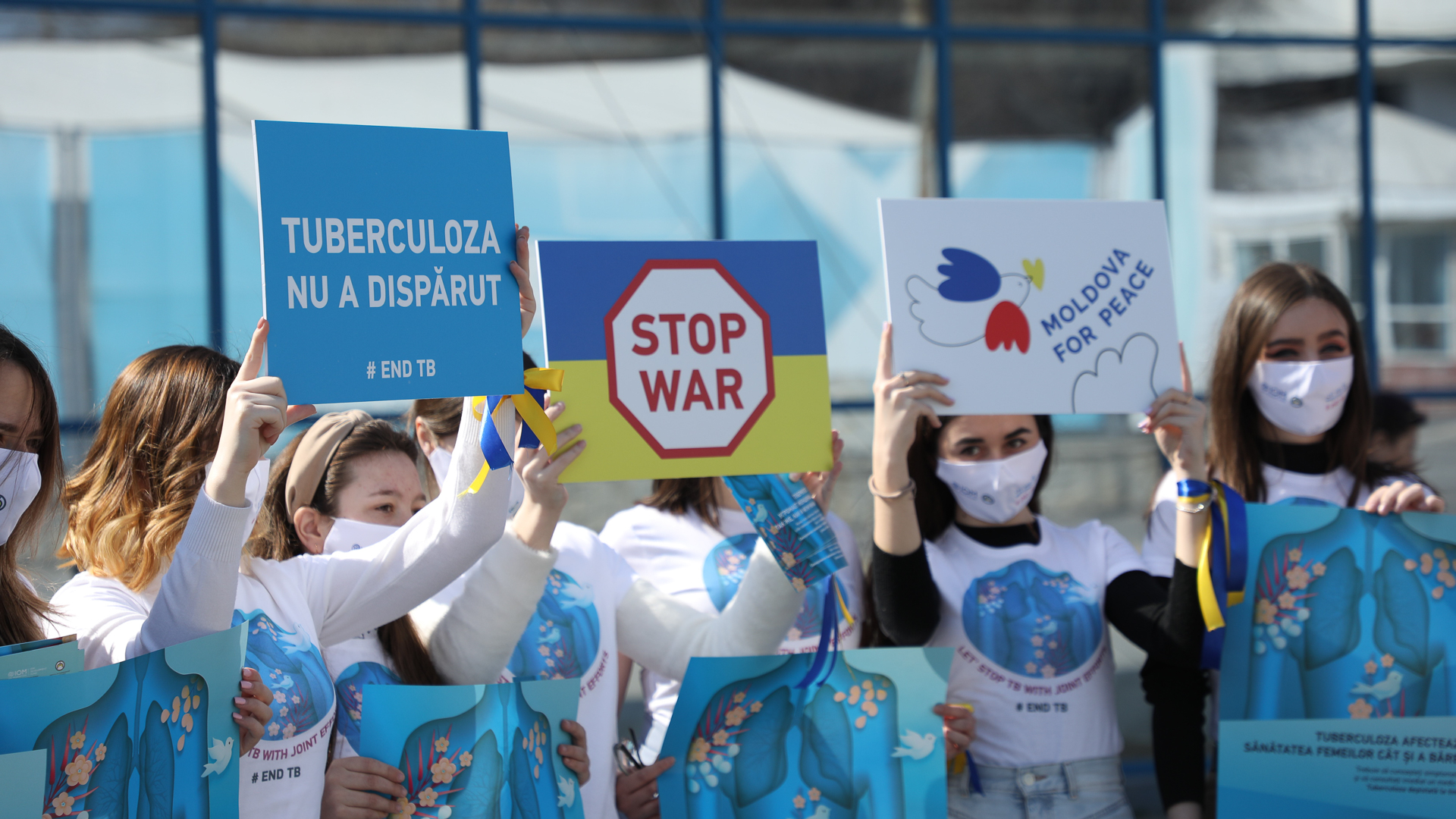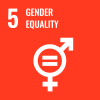Chișinău, 4 July 2022 – “I do not want people to fear me. I am the same Alexandra; the only difference is that I am going through a difficult experience, and I am undergoing medical treatment.”
Alexandra, a 26-year-old mother from the Republic of Moldova, currently lives with her husband, and two children, aged six and two. In 2021, Alexandra left her country for the Czech Republic for six months to work in a fast-food restaurant.
Thousands of Moldovans like her migrate each year, seeking opportunities that are not available at home. Shortly after her stint abroad, she felt tired, had shortness of breath, and suspected that she had a cold but never imagined it could be Tuberculosis (TB), until tests later confirmed the disease.


During the flash mob, the students raised awareness about TB prevention and called for an end to the war in neighbouring Ukraine. Photo: IOM/Monica Chiriac
Like Alexandra, migrants are particularly vulnerable to TB, especially those in irregular situations, as they often do not know how to access health-care services or are afraid to approach authorities for fear of losing their jobs or being deported.
“I knew there was such a disease, but I was never interested in finding out more. I didn't think it could happen to me,” Alexandra explains. “The first symptoms started as abdominal pain, so I initially went to the gynaecologist. I did routine tests and an ultrasound and was told that everything was fine, but the pain did not go away.”
Alexandra was convinced that she had pneumonia, which would be treated as soon as she finished her antibiotic treatment. Although she followed the doctor's instructions, the chest pain did not go away.
“I went to the nurse to get a document for my children, and I was asked why I was not in the hospital. The question astounded me because I didn't think it was that bad. It was confirmed the following day that I had TB. At the time, I was told that I could pose a health risk to my family, and that I would have to stay in the hospital for two years – I was terrified.”


IOM staff distribute IEC materials in local hospitals and reception centres. Photo: IOM/Monica Chiriac; IOM Moldova
Although cases of regular TB have been declining in recent years, Moldova is one of 30 countries with high burden of Multi-Drug Resistant Tuberculosis (MDR-TB), where one third of new cases are multi-drug resistant, making them difficult and expensive to treat.
The progress made on TB diagnosis and treatment has been due to the joint efforts of state institutions, civil society, and international organizations. As a result, the number of new TB cases has been steadily declining.
Nevertheless, the Republic of Moldova still faces a high number of people with TB who encounter difficulties to access health services, leading to a high rate of MDR-TB. As such, TB remains a priority public health issue, and its prevention and control represent strategic objectives of the National TB Control Programme for 2021–2025.
Hard months of treatment followed for Alexandra, who was separated from her children, husband, parents, and friends. “I sometimes felt bad about the way people treated me, how they responded to me and kept their distance. Some friends who knew I was sick supported me, but other people started to avoid me.”


Hygiene kits are regularly distributed as part of infection prevention and control efforts. Photo: IOM/Monica Chiriac
The International Organization for Migration (IOM) has been working for several years with the national TB programme, border police and relevant ministries to run information campaigns on TB prevention, with a special focus on women and their susceptibility to the disease.
Women migrants in the Republic of Moldova travel between their host country for employment purposes and their home several times per year, which exposes them to more health risks.
According to a recent study by IOM in the Republic of Moldova, the frequent movement by female migrants between their host country where they work and their home exposes them to more health risks. However, compared to men, they are more likely to seek medical assistance as soon as they feel ill. Mothers feel responsible to get well as soon as possible to not get their children sick. Unfortunately, due to their migratory nature and little savings they have, women are likely to cut their treatment short as soon as their condition improves in order to resume work.
Public information materials have been placed in airports, hospitals, border crossings, and broadcast on TV, radio and via social media. These have been developed to be gender- and migrant-sensitive, and include Information, Education and Communication (IEC) materials relevant to women who have been affected by TB. The IOM team has also organized several flash mobs in partnership with the medical student association in the Republic of Moldova.


Flash mobs have been an opportunity for students to raise awareness about serious issues in a way appealing to people their age. Photo: IOM/Monica Chiriac
The gender-focused qualitative study focuses on healthcare-seeking behaviour and access to TB treatment among migrants from the Republic of Moldova. Few studies had been conducted so far in the area of TB, gender, and migration, and none in the Republic of Moldova and other European countries.
The study explores the differences between migrant men and women in knowledge, attitudes, and practices related to TB diagnosis, surveillance, treatment, and prevention. Research to date suggests that a targeted approach is needed, including awareness-raising actions that include screening and early referrals. For persons with TB undergoing treatment, psychosocial and socio-economic support is essential for adherence, given the complex and lengthy treatment process.
After five months in the hospital, Alexandra was allowed to follow the treatment at home. IOM supported Alexandra throughout her treatment and offered her the role of ambassador in its TB prevention project for mobile populations.
As an IOM ambassador, Alexandra's role now is to disseminate information about TB prevention and treatment options in her community. IOM provides stipends to the most active female TB caretakers and TB survivors in their role as TB ambassadors and supports them with organizing community support group meetings.

In recent years, progress has been made on TB diagnosis and treatment through the joint efforts of state institutions, civil society, and international organizations. Photo: IOM/Monica Chiriac
IOM’s two-year project for TB prevention in the Republic of Moldova is funded by the IOM Development Fund.
This story was written by Ana Gnip, IOM Communications Officer in the Republic of Moldova.



